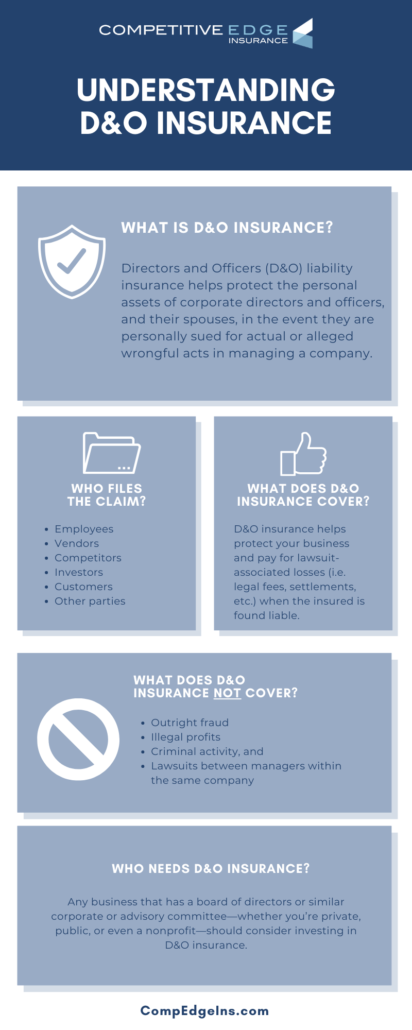Understanding D&O Insurance: What You Need to Know
While the term ” D&O insurance” may seem like just another one of the many acronyms floating around the insurance world, this form of liability insurance is essential in protecting corporate directors and officers.
Let’s chat about directors and officers liability insurance, also known as D&O insurance. We’ll break down what it covers, who needs it, and why all corporate directors and officers should be familiar with this little acronym.
What is D&O Insurance?
Directors and Officers (D&O) liability insurance is insurance coverage that helps protect “the personal assets of corporate directors and officers, and their spouses, in the event they are personally sued… for actual or alleged wrongful acts in managing a company.”
The parties suing a director and/or officer could include:
- Employees
- Vendors
- Competitors
- Investors
- Customers, or
- Other parties
What Does D&O Insurance Cover?
Typically, D&O insurance helps not only protect your business but also helps pay for lawsuit-associated losses (i.e. legal fees, settlements, etc.) when the insured is found liable.
There are, however, three types of insuring agreements—titled Side A, Side B, and Side C—in a typical D&O policy. Read on for more on the different types of directors and officers liability insurance.
What Does D&O Insurance Not Cover?
While “breaches of fiduciary duty, failure to comply with regulations, lack of corporate governance, creditor claims, and reporting errors” are typically covered by D&O insurance, according to Investopedia, D&O insurance does NOT cover the following:
- Outright fraud
- Illegal profits
- Criminal activity, and
- Lawsuits between managers within the same company
Who Needs D&O Insurance?
So, when do D&O claims pop up? Most often, directors are officers are sued for:
- “Breach of fiduciary duty resulting in financial losses or bankruptcy
- Misrepresentation of company assets
- Misuse of company funds
- Fraud
- Failure to comply with workplace laws
- Theft of intellectual property and poaching of competitor’s customers
- Lack of corporate governance”
This considered, you might be wondering: “Does my business need D&O insurance coverage?” The answer might be yes—depending on the size and nature of your business.
Any business that has a board of directors or similar corporate or advisory committee—whether you’re private, public, or even a nonprofit—should consider investing in D&O insurance.
Why? Claims against businesses and their directors are increasing. Plus, if you work with vendors or government entities or even just have employees or customers, you are prone to exposure that could make your organization vulnerable to costly D&O claims.

Interested in learning more about what insurance you need as a business owner? Read on in “how does a building owner know if they are underinsured?”
